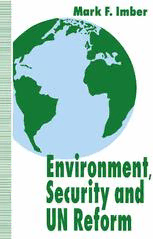
Environment, Security and UN Reform PDF
Preview Environment, Security and UN Reform
ENVIRONMENT, SECURITY AND UN REFORM Also byMark F.lmber THE USA, ILO, UNESCO AND IAEA Environment, Security and UN Reform MarkF.Imber LecturerinInternationalRelations UniversityofStAndrews palgrave macmillan ©MarkF.Imber 1994 Allrightsreserved. Noreproduction,copyortransmissionof thispublicationmaybemade withoutwritten permission. Noparagraphofthispublicationmaybereproduced,copiedor transmittedsavewithwrittenpermissionorinaccordancewith theprovisionsoftheCopyright,DesignsandPatentsAct 1988, orunderthetermsofanylicencePermittinglimitedcopying issuedbytheCopyrightLicensingAgency,90TottenhamCourt Road, London WIP9HE. Anyperson whodoesanyunauthorisedactinrelationtothis publicationmaybeliable tocriminalprosecutionandcivil claimsfordamages. FirstpublishedinGreatBritain1994by THEMACMILLANPRESSLTD Houndmills,Basingstoke,HampshireRG21 2XS andLondon Companiesandrepresentatives throughouttheworld Acataloguerecordforthisbook isavailable fromtheBritish Library. ISBN978-0-333-60590-5 ISBN978-0-230-37583-3(eBook) DOI 10.1057/978-0-230-37583-3 Thisbookisprintedonpapersuitableforrecycling andmade fromfullymanaged andsustainedforestsources.Logging, pulpingandmanufacturingprocesses areexpectedtoconformto theenvironmentalregulations ofthecountryoforigin. FirstpublishedintheUnitedStatesofAmerica1994by ScholarlyandReferenceDivision, ST.MARTIN'SPRESS,INC., 175FifthAvenue, NewYork,N.Y. 10010 ISBN 978-0-312-12168-7(cl.) ISBN 978-0-312-12169-5(pbk.) Library ofCongressCataloging-in-PublicationData Imber, Mark. Environment,security,andUNreform/MarkF.Imber. p. em, Includesindex. ISBN0-312-12168-7(cloth).- ISBN0-312-12169-5(paper) 1.Environmentaldegradation-Developingcountries. 2.Environmentalresponsibility-Developingcountries. 3.Environmentalpolicy-Developingcountries. 4.UnitedNations EnvironmentProgramme. I.Title. GEI60.D44143 1994 363.7'009172'4-dc20 94-5974 CIP TransferredtoDigitalPrinting in2014 ToA. J. R. Groom and John Simpson, whose enthusiasm and excellent teaching most encouraged me to study international organisations Contents ListofTables viii Preface ix Acknowledgements xi TwoHiroshimasEvery Week 2 Debt, Poverty andEnvironment 27 3 The Global Commons 48 4 The UNEP Role 67 5 TwoCheersforRio, 1992 84 6 Beyond UNCED:Revenues andReforms 114 AppendixI TheStockholmPrinciples (1972) 146 Appendix 2 General Assembly Resolution 43/196 150 Appendix3 RioDeclarationonEnvironmentandDevelopment 154 Notes 158 Bibliography 170 Index 175 vii List of Tables I.l Attitudestosecurity II 1.2 The environmental wager 20 1.3 Achievingenvironmentalconsensus 21 1.4 Time/distancepriorities 22 2.1 Deforestationandpopulationcomparisons. 1989 33 2.2 Average annual rates ofGDPgrowth 36 2.3 Averageannual growthofGDPper capita 37 2.4 Percentageofmajor imports facing non-tariffbarriers. 1965-86 39 2.5 Secondarymarket price offace value ofloans 46 3.1 Area ofEEZs 57 3.2 The growth ofthecommonheritageofmankind 65 4.1 LeadingcontributionstotheUNEnvironmentFund 77 4.2 The UNEP budget 78 5.1 The contentsofAgenda21 103 6.1 Major outstandingcontributionstotheUN budget II9 6.2 Status ofUScontributionstotheUN system 121 6.3 USfunding formultilateralprogrammes 122 6.4 USfunding ofUN environmentalactivities 123 6.5 Countriesdispersing equal toormore than0.7per cent targetduring the 1980s 124 6.6 Countriestransferringlessthan 0.7percentofGNP targetduring the 1980s 125 6.7 The eighteen countriesofOECDIDAC.GNPand ODAcompared 125 6.8 Defenceexpendituresat 1985prices 136 6.9 Aproposal foranEconomic SecurityCouncil 142 6.10 Nationalsecurity andenvironmentalsecurity 143 viii Preface Why another book on environmental diplomacy? The issue of environ mental security has been addressed very well in many places, by Arthur Westing, CarolineThomas,Ian Rowlands,Daniel Deudneyandothers.The linkage between environmental degradation and the burdens of Third World debt has also been addressed, by Morris Miller, Susan George and others. Proposalsfortheprotectionoftheglobal commonshavebeenadvo cated since the 1980s byWilli Brandtand Gro HarlemBrundtlandin their world-famous reports, and by Barry Buzan, Steven Krasner and John Vogler, in the academic literature. I am not, however, aware of a single study which attempts to synthesise this triple dilemma, within the analy ticalframeworkofinternationalrelations andfurthermore, linked explicitly tothe agendaofUNreform. In 1989Iconcludedastudy ofthetroubled relationsbetweentheUSand the specialised agencies with the observation that the environmental agenda would prove the toughesttestofthe UN system's ability torecover from a decade ofalleged politicisation and the American-led response of budgetaryausterityandpartial boycott.This study,althoughstandingalone asaninvestigationofenvironmentaland security issues, represents,for the author,asecond stage in thestudy of the UN system, linked by aconcern, common to both studies, to investigate the limits ofthe possible in what David Mitrany called 'the progress of international government'. As a rationalist and agnostic in world ofpassionate fundamentalists, the func tionalistis born to bedisappointed.However, inthe world ofstates, 'bind ingtogetherthose interestwhich arecommon,where they arecommonand totheextentthatthey arecommon'is,alas, theonly wayforward. Inasense thisbook waswritten backwards:eachchapterinitiallychosen as the point ofintroduction needed explaining by one that logicallyhad to precede it. From a nuts-and-bolts investigation of the mandate and per formance of the United Nations Environment Programme, UNEP, com missioned by the ESRC inAugust 1990,it emergedthat UNEP could only be explained if prefaced by discussion ofmore fundamental questions of the context in which the post-Stockholm development of the international environmentalregulationhad beenconducted. In trying to understand the causes of diplomatic inertia, intransigence and the persistently egotistical behaviour of states caught in the two 'prisoner's dilemmas' of environmental security and military security, I was repeatedly impressed by thecentrality offinancial arrangementsas an ix x Preface underlyingfactor.ForThirdWorldcountries theirburdenofdebtiscritical to their inability to embrace sustainable development policies. For the North,fearofthelossofcompetitiveadvantage, therecessionary condition of industry since 1990 and, above all, a decade of Mrs Thatcher and PresidentReagan,ledhostilitytoregulationandinterventioninthemarket place,haveinhibitedtherecognitionofenlightenedself-interest inaddress ingtheneedforhigherenvironmental standards. Much that is written herewillbefamiliar totheNGO anddevelopment studies community, but it is not common knowledge within the inter national relations community, generally concerned with diplomatic and military relations. Herein lies another justification for persevering with what I admit is a work of synthesis. I am concerned to present to an IR readership the argument that environmental questions and UN reform are centralandnotperipheral tothefield,andthatinnumerable 'security'ques tionscannotbeunderstoodwithoutadoptinganenvironmentalperspective.
